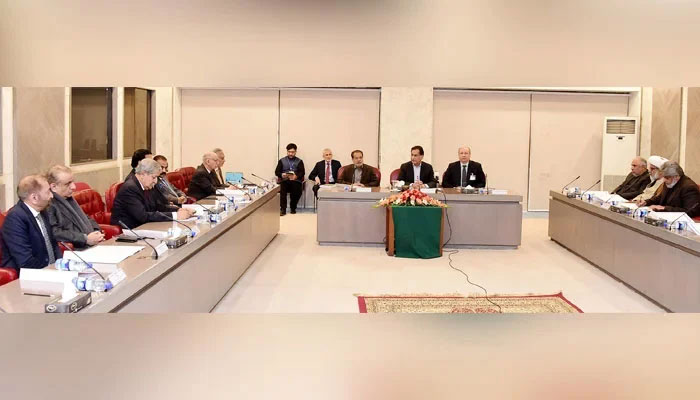Third time’s the charm?
Delay in Al-Qadir Trust case verdict has only added to the mistrust
The announcement of a third session of talks between the government and the PTI, scheduled for January 16, brings some hope in a politically polarised landscape. This in-camera session, held under the auspices of National Assembly Speaker Sardar Ayaz Sadiq, comes at a critical juncture. The PTI’s demands – the release of political prisoners and the formation of a judicial commission to investigate the events of May 9, 2023, and November 26, 2024 – will reportedly be presented in writing. Yet, even as both sides move toward dialogue, the spectre of mistrust looms large, threatening to derail the process before it gains momentum. The PTI’s insistence on a January 31 deadline for concluding talks has also raised some questions about the sustainability of this negotiation effort. While deadlines can serve as tools to inject urgency, they may also backfire by imposing an artificial rigidity on an inherently fluid process. Observers have noted that the PTI’s history of contesting unfavourable outcomes casts doubt on whether it would accept the conclusions of a new judicial commission, should the investigations not align with its narrative.
The selection of judges for such commissions is likely to be a contentious issue as well. A failure to agree on the composition of the commission could result in another deadlock, negating the purpose of the dialogue altogether. Still, if both sides manage to reach a consensus, the formation of judicial commissions could pave the way for greater accountability and transparency – qualities sorely lacking in Pakistan’s political arena. The PTI’s apprehensions about being perceived as seeking a ‘deal’ complicate matters further. The delay in the Al-Qadir Trust case verdict has only added to the mistrust. Scheduled for January 17 after being postponed three times, the verdict is now mired in speculation. Legal experts assert that the case’s handling, thus far adhering to fair trial standards, risks becoming controversial due to all these unexplained delays. The government’s narrative of inevitable conviction and the PTI’s claims of coercion have both led to an unfortunate environment of suspicion, undermining the credibility of both the judicial process and the dialogue.
Transparency is paramount and both sides need to demonstrate a commitment to the rule of law and respect for judicial outcomes, even if these outcomes are inconvenient. Amidst the noise, the essence of dialogue must not be lost. For the PTI, a focus on substantive issues, rather than posturing, could shift public perception in its favour. For the government, meeting the PTI halfway by agreeing to at least some of its demands, such as the release of political prisoners, could build trust and demonstrate good faith. Both sides must recognise that the alternative to dialogue is a return to instability. There is also the idea that the PTI’s demands for a judicial commission may partly be a face-saving measure to justify its participation in talks. If so, the government’s acceptance of this demand could keep the dialogue alive. The stakes are too high for either side to walk away without exploring every avenue for resolution. If conducted with sincerity, these events could break the cycle of political brinkmanship that has paralysed the country. So will this third round of talks prove to be the charm? It all hinges on the willingness of both parties to prioritise national interest over political expediency.
-
 Kanye West's Last Measure To Save Bianca Censori Marriage As He Tries To Salvage Image
Kanye West's Last Measure To Save Bianca Censori Marriage As He Tries To Salvage Image -
 Kim Kardashian Finally Takes 'clear Stand' On Meghan Markle, Prince Harry
Kim Kardashian Finally Takes 'clear Stand' On Meghan Markle, Prince Harry -
 Christina Applegate Makes Rare Confession About What Inspires Her To Keep Going In Life
Christina Applegate Makes Rare Confession About What Inspires Her To Keep Going In Life -
 Patrick J. Adams Shares The Moment That Changed His Life
Patrick J. Adams Shares The Moment That Changed His Life -
 Selena Gomez Getting Divorce From Benny Blanco Over His Unhygienic Antics?
Selena Gomez Getting Divorce From Benny Blanco Over His Unhygienic Antics? -
 Meet Arvid Lindblad: Here’s Everything To Know About Youngest F1 Driver And New Face Of British Racing
Meet Arvid Lindblad: Here’s Everything To Know About Youngest F1 Driver And New Face Of British Racing -
 At Least 30 Dead After Heavy Rains Hit Southeastern Brazil, 39 Missing
At Least 30 Dead After Heavy Rains Hit Southeastern Brazil, 39 Missing -
 Courtney Love Recalls How ‘comparison’ Left Marianne Faithfull ‘broken’
Courtney Love Recalls How ‘comparison’ Left Marianne Faithfull ‘broken’ -
 Pedro Pascal Confirms Dating Rumors With Luke Evans' Former Boyfriend Rafael Olarra?
Pedro Pascal Confirms Dating Rumors With Luke Evans' Former Boyfriend Rafael Olarra? -
 Ghost's Tobias Forge Makes Big Announcement After Concluding 'Skeletour World' Tour
Ghost's Tobias Forge Makes Big Announcement After Concluding 'Skeletour World' Tour -
 Katherine Short Became Vocal ‘mental Illness’ Advocate Years Before Death
Katherine Short Became Vocal ‘mental Illness’ Advocate Years Before Death -
 SK Hynix Unveils $15 Billion Semiconductor Facility Investment Plan In South Korea
SK Hynix Unveils $15 Billion Semiconductor Facility Investment Plan In South Korea -
 Buckingham Palace Shares Major Update After Meghan Markle, Harry Arrived In Jordan
Buckingham Palace Shares Major Update After Meghan Markle, Harry Arrived In Jordan -
 Demi Lovato Claims Fans Make Mental Health Struggle Easier
Demi Lovato Claims Fans Make Mental Health Struggle Easier -
 King Hospitalized In Spain, Royal Family Confirms
King Hospitalized In Spain, Royal Family Confirms -
 Japan Launches AI Robot Monk To Offer Spiritual Guidance
Japan Launches AI Robot Monk To Offer Spiritual Guidance




